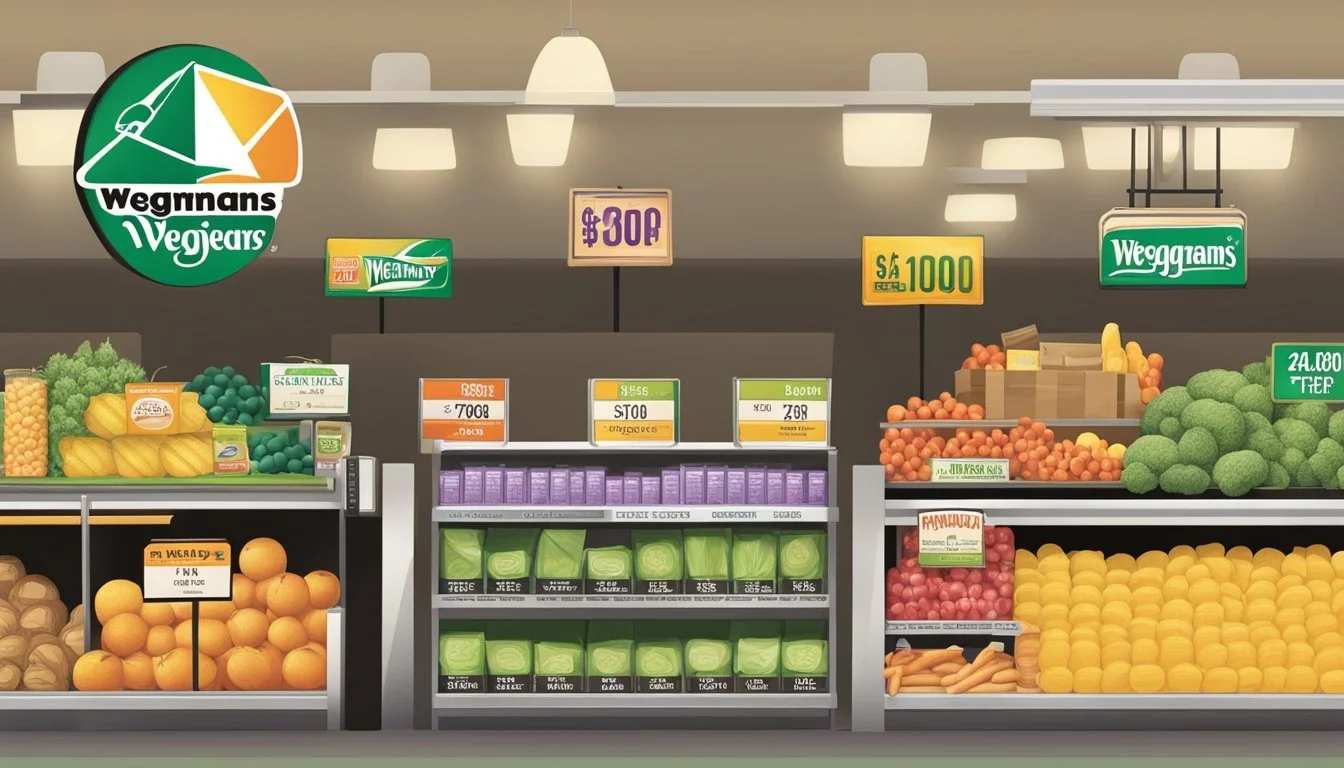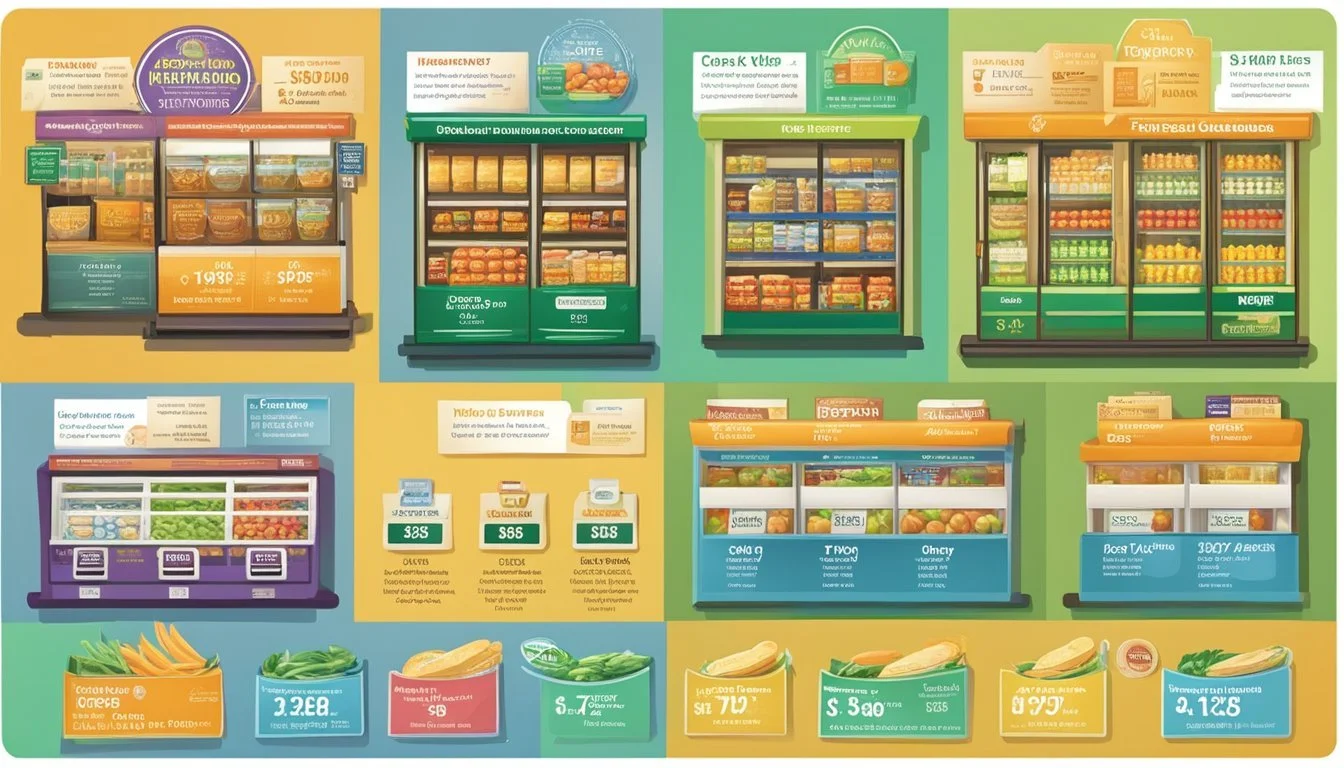Is Wegmans Cheaper Than Harris Teeter?
Comparing Grocery Prices
Part of Our Grocery Store Guide with Details on Wegmans Prices and Harris Teeter Prices
When comparing Wegmans and Harris Teeter, two prominent grocery chains, price is a key factor for consumers making informed shopping decisions. Wegmans generally offers lower prices in categories such as beverages, dairy, dry foods, frozen foods, and household cleaners. It is also noted for its extensive range of products, often stocking 10,000 to 30,000 more items than Harris Teeter, which can influence a shopper's preference based on variety and availability.
Harris Teeter, while possibly higher in prices for certain categories, has its own competitive edges. It provides better deals in baking goods, canned goods, personal care, and also in the household cleaners category, showcasing that each store has its areas of cost efficiency. The difference in pricing between these stores is not uniform across all product lines; it varies with the type of items and the ongoing deals at any given time.
Therefore, shoppers interested in saving money or seeking the best value for quality products might find Wegmans to be more economical for a broad range of goods. However, for specific categories or preferred brands, Harris Teeter might offer better savings, underscoring the importance of comparing prices for the particular items consumers need.
Comparing Wegmans and Harris Teeter
Wegmans and Harris Teeter cater to distinct market segments and customer preferences, reflected in their pricing, store offerings, and geographic footprints. A close examination of their history, expansion, and business models provides insight into their competitive positioning.
History and Brand Presence
Wegmans began in 1916 as a small food market in Rochester, New York, and grew into a respected regional supermarket chain known for its wide product selection and dedicated customer service. Today, Wegmans is the epitome of a family-owned, quality-focused supermarket with a strong commitment to community values.
In contrast, Harris Teeter, founded in 1936 in Charlotte, North Carolina, has carved out a niche as a high-end grocery chain. As part of the Kroger family since 2014, it maintains a reputation for personalized shopping experiences and premium product offerings.
Both brands have cultivated loyal customer bases, but Wegmans’ brand image is associated with larger stores and a more extensive selection, while Harris Teeter emphasizes a more boutique, service-oriented approach.
Store Locations and Expansion
Wegmans operates primarily in the Northeast and Mid-Atlantic regions, with over 100 stores. It has seen careful but consistent growth, focusing on market penetration before expanding to new areas.
Harris Teeter, conversely, has a presence primarily in the Southeastern United States, with over 250 stores. It too has been strategic in its growth, often opting for upscale neighborhoods and locations.
The expansion strategies of both supermarkets reflect their operational philosophies: Wegmans focusing on comprehensive one-stop shopping experiences and Harris Teeter on convenience and accessibility within affluent localities.
Supermarket Business Models
Wegmans and Harris Teeter both operate within the competitive supermarket industry, but their business models diverge to cater to their target demographics:
Wegmans emphasizes a variety of goods, which includes a range of up to 30,000 more items than Harris Teeter. This breadth of selection positions Wegmans as a destination for customers seeking diverse culinary options.
Harris Teeter, while carrying fewer products, often focuses on a unique blend of grocery items mixed with specialty and gourmet options, catering to customers looking for quality and specialty products.
Regarding pricing, research indicates that Wegmans often offers lower prices in various categories, especially beverages, dairy, and frozen foods. Harris Teeter, by comparison, may provide more competitive pricing in areas such as bakery and personal care. Both brands strive to find the pricing equilibrium that matches their consumers’ expectations while providing a shopping environment that aligns with their brand ethos.
Price Analysis
This section evaluates the cost differences between Wegmans and Harris Teeter, examining price surveys, average pricing on everyday items, and each store's approach to discounts and sales.
Price Surveys and Research
Research indicates a discrepancy in pricing between Wegmans and Harris Teeter. Wegmans has been found to be more affordable in categories such as beverages, dairy, frozen foods, and dry foods. On the contrary, Harris Teeter offers better prices in baking goods, canned goods, and personal care.
Average Pricing Across Common Items
An exploration of both Wegmans' and Harris Teeter's pricing in common grocery categories reveals specific trends.
Beverages: Wegmans provides cheaper options
Dairy: Wegmans typically comes out ahead in affordability
Dry & Frozen Foods: Wegmans again offers lower average prices
Baking Goods & Canned Goods: Harris Teeter tends to be less expensive
Personal Care: Harris Teeter has been found to offer lower prices
Discounts and Sales Strategies
Both Wegmans and Harris Teeter employ various sales strategies to attract customers, which can impact the overall prices consumers pay.
Wegmans is known for its consistent low prices and occasional promotional deals.
Harris Teeter offers weekly specials, double coupon events, and loyalty programs that significantly reduce prices for its members, which can sometimes lead to lower effective prices compared to Wegmans' standard prices.
Product Selection and Quality
When evaluating Wegmans and Harris Teeter, their approach to product selection and quality emerges as a critical factor influencing consumer choice. Each store has distinct attributes in terms of produce and meat quality, and the balance they strike between store-brand and national brand offerings, along with the breadth of their product categories.
Produce and Meat Quality
Wegmans is known for its emphasis on high-quality fresh produce and meats. Shoppers have noted that the fruits and vegetables often appear fresher and more vibrant, while the meats are reputed to be of a higher standard in terms of freshness and sourcing. Similarly, Harris Teeter offers good quality produce and meats, but customers report a more variable experience in comparison.
Store-Brand vs. National Brands
In the domain of store brands versus national brands, Wegmans' store brand products are recognized for their quality, often competing closely with or surpassing the quality of national brands. Harris Teeter, while offering competitive store brands, is perceived to place a stronger emphasis on namesake products.
Product Categories and Selection
The product categories offered by both stores are expansive, but Wegmans tends to excel with a broader selection. The store provides a wide variety of options across beverage, dairy, dry foods, and frozen foods categories. Conversely, Harris Teeter is identified as potentially offering better value in specific categories such as baked goods and canned goods, although the overall selection at Wegmans typically provides more choices for the consumer.
Customer Experience and Service
Customer experience in grocery stores is formed by various factors, from staff helpfulness to store layout. Recognizing these elements offers insight into why a shopper might prefer one store over another.
Staff Helpfulness and Store Design
Wegmans and Harris Teeter invest in creating a pleasant shopping environment, but their approaches differ. Wegmans' staff members are often praised for being proactive and friendly. They are known to be available for assistance, contributing positively to the customer experience. Harris Teeter also has a reputation for good customer service, with polite and helpful employees. Store design plays a significant role in customer satisfaction. Wegmans typically boasts a spacious layout with clear signage, often making it easier for customers to navigate and find products.
Checkout and Shopping Experience
Both Wegmans and Harris Teeter focus on a streamlined checkout process to enhance the shopping experience. Customers value fast and efficient cashiers, which both stores generally provide. Wegmans often receives positive feedback for its shorter waiting times and self-checkout options which cater to customers' need for a speedy shopping trip. Harris Teeter also implements effective checkout methods but may not match the speed and efficiency consistently seen at Wegmans locations.
Customer Ratings and Loyalty
Customers often express their satisfaction through ratings, which can reflect the overall service quality of a grocery store. Wegmans tends to generate loyal customers, with folks returning due to their positive shopping experiences. This loyalty is attributed to the combined effect of helpful staff, enjoyable store layout, and high service standards, leading to impressive customer ratings. Harris Teeter also has a loyal following, often favored for its clear store design and customer service, yet may not outperform Wegmans in customer ratings across all service aspects.
Convenience and Accessibility
When evaluating grocery stores, shoppers often consider how easily they can access the store and the services it offers. Convenient locations and efficient delivery services are crucial in delivering a seamless shopping experience.
Location Convenience
Wegmans and Harris Teeter both operate in various locations across the United States, with a strong presence in the eastern states. The exact number of locations may vary, but Wegmans typically operates larger stores in fewer locations, while Harris Teeter offers a greater number of stores that might be more dispersed. This can affect shoppers differently depending on their proximity to each chain:
Wegmans: Has a robust presence in the Northeast and Mid-Atlantic regions.
Harris Teeter: More widely spread across the Southeast and Mid-Atlantic, benefiting residents in those areas with potentially closer options.
Delivery Options and Services
Both Wegmans and Harris Teeter have responded to the growing demand for convenient shopping methods by offering various delivery services. They strive to ensure a high level of convenience and accessibility for their customers through:
Delivery Options:
Wegmans partners with delivery services to provide same-day delivery in several locations.
Harris Teeter offers their own delivery service, as well as curbside pickup, to cater to the needs of their customers.
Services: Both supermarkets have implemented online shopping platforms, allowing customers to order groceries effortlessly from the comfort of their homes. They are each equipped with user-friendly websites and mobile apps to enhance the shopping experience.
Overall, customers' convenience is significantly shaped by the vicinity of store locations and the efficiency of delivery services each chain provides. Wegmans and Harris Teeter continue to adapt to consumer needs, balancing location convenience with robust delivery options and services.
Market Position and Competitiveness
Wegmans and Harris Teeter are both key players in the supermarket industry, vying for market share with distinct strategies of geographical expansion and competitive pricing that engage various demographic segments.
Demographic and Geographic Reach
Wegmans, with its expansive product range, appeals to a broad demographic seeking variety and a premium shopping experience. Its geographic reach extends predominantly in the northeastern United States, with some stores in the mid-Atlantic. Harris Teeter, on the other hand, has a strong presence in the southeastern US, targeting consumers who value quality and convenience, often reflected by their location in affluent neighborhoods.
Comparison with National and Local Chains
Compared to national giants like Walmart, Target, Costco, and Kroger, Wegmans maintains a competitive edge in product diversity but may not always compete on price, while Harris Teeter's pricing is often comparable with these larger chains in selected categories such as canned goods and personal care. With regards to quality and store experience, both chains are perceived to stand above local chains like Food Lion and national organic-focused chains like Whole Foods. Against regional competitors like Publix and Giant, Wegmans and Harris Teeter maintain a competitive stance. For instance, pricing at Wegmans was found to be about on par with that of Giant and Harris Teeter, and lower than Safeway by around seven percent. In regional markets, where these supermarkets compete directly, such as the Triangle area, Publix and Wegmans were noted to have similar price points to Harris Teeter.
Moreover, budget-friendly chains, Aldi and Lidl, are incentivizing larger supermarkets to re-evaluate their pricing structures to remain competitive while supermarkets like Trader Joe's and Market Basket are known for their curated selections, creating a value proposition unique from the expansive selection provided by Wegmans.
Cost-Saving Strategies for Consumers
When it comes to grocery shopping, consumers can employ strategic measures to optimize savings. The following subsections highlight practical approaches one can take at stores like Wegmans and Harris Teeter to minimize grocery bills.
Utilizing Store Promotions
Store promotions are a dynamic tool for consumers to save money. Wegmans and Harris Teeter regularly provide weekly ads with discounted items, known as loss leaders, to draw in customers. Shoppers should keep an eye on these ads and plan their shopping lists around the promotions. Additionally, leveraging seasonal sales can result in significant savings, especially for non-perishable items or freezable products.
Effectiveness of Membership Programs
Membership programs at grocery stores often offer exclusive benefits that lead to direct savings. For example, Harris Teeter offers VIC (Very Important Customer) memberships, giving members access to special discounts and e-VIC deals, which can be more cost-effective for regular shoppers. Consumers can also take advantage of Amazon Prime discounts at certain grocery retailers that offer perks for being part of the Amazon ecosystem, thereby extending their savings portfolio through linked benefits.
It's also crucial for families to compare the overall benefits and costs of different membership programs, as the savings must outweigh any fees associated with the program for it to be considered effective.
Analysis and Recommendations
In assessing the cost-effectiveness of Wegmans and Harris Teeter, it is crucial to analyze pricing strategies and consumer shopping preferences to provide thorough recommendations.
Evaluating Overall Cost-Efficiency
When it comes to evaluating the overall cost-efficiency between Wegmans and Harris Teeter, careful consideration of the diverse product selections and their associated pricing is essential. Research indicates that Wegmans offers a broader selection, often at more affordable rates in categories such as beverages, dairy, dry foods, and frozen foods. Conversely, Harris Teeter displays cost advantages in baking goods, canned goods, and personal care items.
The determination of which store is cheaper depends on specific purchasing needs. For those consumers seeking an Amazon-like experience with a wide range of products at competitive prices, Wegmans appears to lead in providing budget-friendly options. In contrast, shoppers focused on select categories may find Harris Teeter to be more economical.
Consumer Decision-Making
Consumers are advised to make informed decisions based on individual shopping lists and preferences. For regular purchases across a variety of goods, Wegmans may offer a cost-efficient alternative. When comparing the two, it is advisable for shoppers to:
Monitor weekly sales and discounts at both stores.
Compare prices for frequently purchased items, factoring in store brands versus national brands.
Consider value-added aspects such as customer service and store layout.
Subscribers to Consumerpedia and similar outlets, as well as listeners to podcasts focused on consumer advice, can derive insights on the latest deals and shopping tips that could further influence the affordability of their grocery purchases.
By conducting price checks and assessing the total value of their shopping experience, consumers can leverage the strengths of both Wegmans and Harris Teeter to maximize savings and satisfaction.
Conclusion
When comparing Wegmans and Harris Teeter, one can observe that Wegmans generally offers lower pricing in several categories. Shoppers looking for better deals on beverages, dairy, dry foods, frozen foods, and cleaners might find Wegmans to be the preferred option.
Harris Teeter, on the other hand, appeals to customers through competitive prices in the baking goods, canned goods, personal care, and cleaners segments. It is important for consumers to note that pricing can vary by location and over time.
Moreover, Wegmans’ extensive product selection often exceeds Harris Teeter's by a substantial margin, potentially offering anywhere from 10,000 to 30,000 additional items. This can be a significant factor for those who value variety and a one-stop shopping experience.
For shoppers who prioritize store brand value, Wegmans store brand items are typically found to be more cost-effective than those at Harris Teeter. It is suggested that consumers may also find similar quality levels between the two chains' offerings.
Budget-conscious consumers may benefit from comparing prices for their specific shopping lists at both Wegmans and Harris Teeter, as each store has its own set of advantages. The overall shopping experience and budget impact will ultimately determine a shopper's choice between the two grocery stores.







